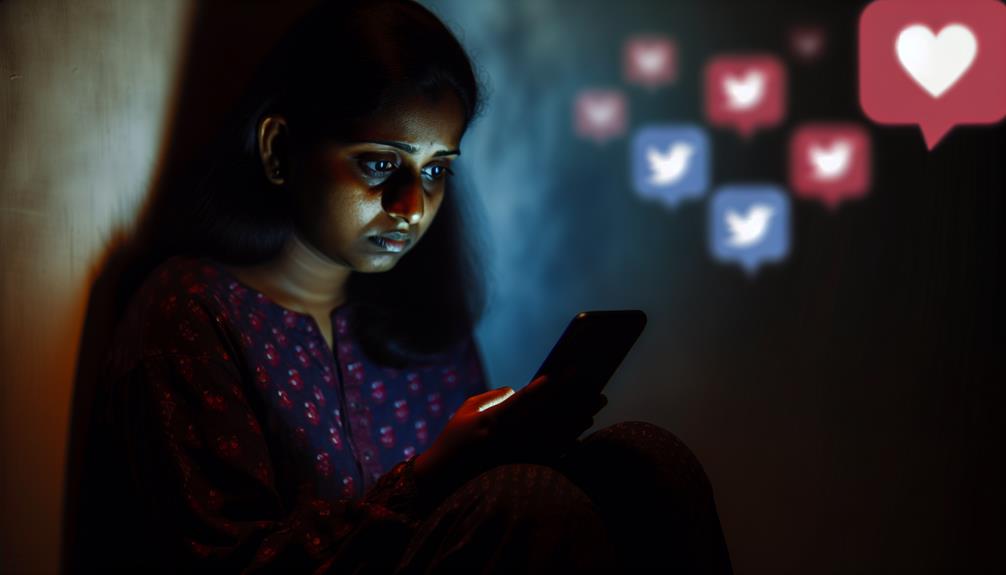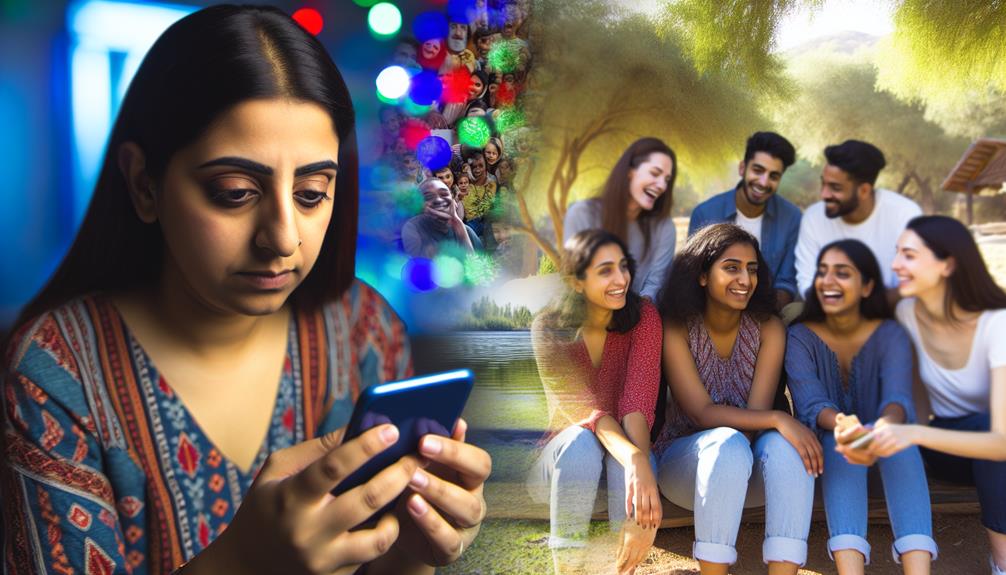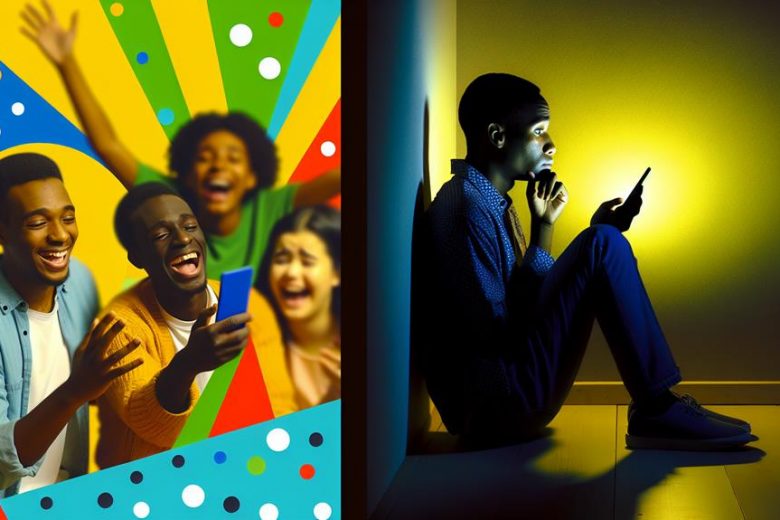You might've noticed how social media plays a dual role in your mental health, offering both connection and isolation. While it can provide support and a sense of community, it also exposes you to unrealistic comparisons and constant scrutiny. This complex relationship raises important questions about how your online interactions shape your self-image and emotional well-being. Are you truly benefiting from your engagement, or is it time to reassess your digital habits? Understanding these dynamics could be essential for maintaining a healthier mindset in today's hyperconnected world.
Contents
- 1 Positive Effects of Social Media
- 2 Negative Effects of Social Media
- 3 Social Media and Anxiety
- 4 Social Media and Depression
- 5 The Impact of Comparison
- 6 Building Online Communities
- 7 Strategies for Healthy Use
- 8 Frequently Asked Questions
- 8.1 How Does Social Media Impact Sleep Patterns and Quality?
- 8.2 Can Social Media Use Lead to Addiction-Like Behaviors?
- 8.3 What Role Does Age Play in Social Media's Effects on Mental Health?
- 8.4 How Can Businesses Use Social Media Responsibly Regarding Mental Health?
- 8.5 Are There Any Positive Effects of Social Media for Introverts?
- 9 Conclusion
Positive Effects of Social Media
Social media can have a surprisingly positive impact on mental health, offering users a platform to connect, share, and find support. You might not realize it, but these platforms can provide valuable self-expression opportunities. By sharing your thoughts, feelings, and experiences, you can foster a sense of belonging and validation that's often hard to find elsewhere.
Moreover, social media facilitates connection with supportive networks. Whether it's joining groups focused on specific challenges or interests, or simply following accounts that resonate with you, these interactions can lead to meaningful relationships. These supportive networks can act as creative outlets, allowing users to express themselves artistically and emotionally, which is essential for mental well-being.
Information sharing is another key aspect. Many users actively seek and share resources related to mental health, creating a wealth of knowledge that can help others navigate their own struggles. Awareness campaigns play a pivotal role too, spreading vital information and reducing stigma around mental health issues.
Additionally, mental health advocacy is prominent on social media platforms, where users can engage in discussions that promote understanding and compassion. The positive reinforcement found in likes, shares, and comments can uplift your spirits and motivate you to keep expressing yourself.
In essence, social media can be a powerful tool for mental health, providing you with the connection facilitation, support, and resources you need to thrive in an often isolating world.
Negative Effects of Social Media
It's important to recognize that while social media can connect us, it can also contribute to feelings of anxiety and depression. Many people find themselves comparing their lives to the idealized versions of others they see online, which can trigger significant stress. Understanding these negative effects is essential for maintaining your mental health in a digitally connected world.
Anxiety and Depression Increase
Maneuvering the world of social media can often lead to heightened feelings of anxiety and depression. You might find yourself overwhelmed by social media overload, constantly bombarded with notifications, messages, and posts. This relentless influx can make it hard to disconnect, leaving you feeling drained and anxious.
Moreover, while social media connects you with others, it can also foster a sense of online isolation. You may scroll through your feeds, witnessing friends' seemingly perfect lives, which can intensify feelings of loneliness and inadequacy. This paradox—being surrounded by others yet feeling isolated—can contribute notably to depressive symptoms.
Research shows that excessive use of social media can be linked to increased levels of anxiety and depression. It's essential to recognize these patterns and consider how your online habits affect your mental well-being. Taking breaks from social media, setting boundaries, or seeking support can help alleviate these feelings. By prioritizing your mental health, you can create a more balanced approach to social media, ultimately reducing the impact it has on your emotional state.
Unrealistic Comparison Triggers Stress
Scrolling through curated images of friends and influencers living seemingly flawless lives can lead to overwhelming feelings of inadequacy. You might find yourself comparing your everyday reality to their highlighted moments, triggering self-esteem issues and fostering unrealistic expectations. This constant cycle of comparison can create immense stress, as you chase an ideal that simply isn't attainable.
Consider these points:
- Highlight Reel vs. Reality: Social media often showcases only the best moments, leaving out the struggles and imperfections that everyone faces.
- Pressure to Perform: Seeing others' successes can pressure you to meet similar standards, leading to burnout and anxiety.
- Fear of Missing Out (FOMO): Watching others enjoy experiences can intensify feelings of isolation and self-doubt, making you feel as if you're falling behind.
Understanding the impact of these comparisons is vital for your mental well-being. Recognizing that social media isn't an accurate reflection of reality can help you mitigate these feelings. Remember, it's okay to take a step back from the screen and focus on your own journey, free from the weight of unrealistic comparisons.
Social Media and Anxiety

When you scroll through social media, it's easy to feel the weight of comparison as you measure your life against the seemingly perfect experiences of others. This constant pressure can heighten anxiety, especially if you're also facing cyberbullying or the fear of missing out on social events. Understanding these factors is essential for managing your mental well-being in a digital age.
Social Comparison Pressure
In today's digital landscape, the pressure to compare oneself to others on social media can be overwhelming, often leading to heightened anxiety. You might find yourself scrolling through perfectly curated feeds, feeling like you don't measure up. This constant comparison can trigger self-esteem issues, as you internalize the idea that others are living happier, more successful lives. It's not uncommon to feel the weight of peer pressure, making you question your own worth and achievements.
Consider these points:
- Curated Perception: Most posts highlight only the best moments, distorting reality and setting unrealistic standards.
- Fear of Missing Out (FOMO): Seeing friends' exciting experiences can amplify feelings of inadequacy and isolation.
- Social Validation: Relying on likes and comments for self-worth can create a vicious cycle of anxiety and dependency.
Understanding the impact of social comparison pressure is essential. It's okay to feel overwhelmed; acknowledging these feelings can be the first step in mitigating their effects. Remember, you're not alone in this struggle, and there are healthier ways to engage with social media that prioritize your mental well-being.
Cyberbullying Impact
The pressure to compare yourself to others on social media can easily escalate into a more severe issue, particularly when faced with the harsh realities of cyberbullying. Many individuals experience anonymous harassment online, which can feel relentless and isolating. This form of bullying leaves lasting emotional scars, often leading to increased anxiety and depression. You might find yourself questioning your self-worth and feeling like you're constantly under a microscope.
Research shows that victims of cyberbullying are more likely to experience significant mental health challenges, including heightened levels of anxiety. The anonymity of the internet allows bullies to target you without fear of repercussions, making it even more difficult to cope. It is crucial to build emotional resilience during these tough times. This means developing coping strategies and seeking support from friends, family, or mental health professionals.
Fear of Missing Out
Scrolling through your social media feed can often trigger a nagging sense of anxiety, especially when you see friends posting about events or experiences you weren't part of. This feeling, commonly known as Fear of Missing Out (FOMO), can lead to a relentless pursuit of social validation. You may find yourself questioning your place in your social circles or feeling inadequate compared to others.
FOMO triggers can create a cycle of anxiety and dissatisfaction, making it hard to appreciate your own life. When you're constantly scrolling, it's easy to overlook the fulfilling moments happening right in front of you.
- Comparison: You might compare your life to the curated highlights of others, leading to feelings of envy or inadequacy.
- Social Pressure: The urge to attend every event or be part of every trend can become overwhelming, affecting your mental well-being.
- Isolation: Ironically, being glued to your screen can make you feel more disconnected from real-life relationships.
Recognizing these patterns is the first step toward breaking free from the anxiety FOMO induces, allowing you to focus on the meaningful connections in your life.
Social Media and Depression
When you plunge into social media, it's easy to get swept away by the highlight reels of others' lives, but this constant comparison can take a toll on your mental health, particularly leading to feelings of depression. Studies have shown that excessive social media use is linked to increased symptoms of depression, with users often feeling isolated despite being connected.
You might find yourself scrolling through posts, seeing friends' vacations, promotions, or seemingly perfect relationships, and it's tough not to feel inadequate in comparison. This can create a cycle of negative self-perception, where you believe your life doesn't measure up. Ironically, while social media is designed to foster social connection, it can leave you feeling more alone than ever.
Moreover, the emotional support you receive online often lacks the depth of face-to-face interactions. While a "like" or a comment can feel nice in the moment, it doesn't replace the warmth of a genuine conversation. Without this real emotional support, you might struggle to cope with feelings of sadness or loneliness, which can exacerbate depressive symptoms.
It's essential to recognize these patterns and take proactive steps. You can limit your time on social media, curate your feeds to include uplifting and positive content, or even engage in activities that foster offline connections. By prioritizing real-life interactions and seeking genuine emotional support, you can mitigate the impact that social media may have on your mental health and work towards a more balanced relationship with technology.
The Impact of Comparison

Comparison can be a silent thief, stealing your joy and self-worth as you navigate through social media platforms. Every time you scroll through your feed, you might find yourself measuring your life against carefully curated snapshots of others. This constant comparison can lead to significant self-esteem issues and distort your body image.
You're not alone in feeling this way; studies have shown that frequent social media use is linked to increased feelings of inadequacy and discontent. You might catch yourself thinking:
- "Why can't I look like that?"
- "Their life seems so perfect; what's wrong with mine?"
- "I wish I had their confidence and success."
These thoughts can spiral, impacting your mental health and self-perception. Social media often presents an idealized version of reality, filled with filters and staged moments. When you compare yourself to these highlights, it's easy to forget that everyone has struggles behind the scenes.
Recognizing the impact of comparison is the first step toward reclaiming your self-worth. It's crucial to remind yourself that what you see online isn't always the full picture. Prioritize self-compassion and focus on your journey, rather than someone else's. By setting healthy boundaries with social media and curating your feed to follow content that uplifts you, you can start healing those self-esteem issues and build a more positive body image. Remember, your value isn't defined by likes or followers, but by who you are.
Building Online Communities
The negative effects of comparison can often overshadow the positive aspects of social media, but one of its most valuable features is the ability to build supportive online communities. These virtual spaces allow you to connect with people who share similar experiences and challenges, creating a sense of belonging that can be difficult to find elsewhere. Research shows that being part of a community can greatly enhance your mental well-being, providing emotional support and reducing feelings of isolation.
When you engage with these online communities, you're not just a passive observer; you're actively participating in discussions that matter to you. This community engagement can foster a sense of empowerment, as you share your story and listen to others. The mutual exchange of support helps cultivate resilience, which is essential for traversing life's ups and downs.
Moreover, online communities often provide resources, advice, and encouragement tailored to your needs. Whether you're dealing with anxiety, depression, or any other mental health issues, these groups can be a lifeline. They remind you that you're not alone in your struggles and that others have faced similar challenges and emerged stronger.
Ultimately, by tapping into the power of virtual support, you can enhance your mental health and well-being. So, don't hesitate to seek out these communities—your journey toward healing and connection may just be a click away.
Strategies for Healthy Use

Finding a balanced approach to social media can greatly impact your mental health. By implementing specific strategies, you can foster a healthier online experience that supports your well-being. It's crucial to practice mindful consumption, which means being aware of the content you engage with and how it makes you feel. Curate your feed to include positive engagement and supportive networks, ensuring the content you see uplifts rather than drains you.
Consider these strategies for healthier social media use:
- Set boundaries: Determine how much screen time is appropriate for you. Set limits to prevent excessive scrolling that can lead to anxiety or depression.
- Take a digital detox: Regularly disconnect from social media to recharge. This mental break helps you reconnect with offline activities and reduces the overwhelming nature of constant connectivity.
- Practice intentional posting: Share content that reflects your values and interests. This not only enhances your online presence but also fosters genuine connections.
Frequently Asked Questions
How Does Social Media Impact Sleep Patterns and Quality?
Excessive social media use can lead to sleep disruption, reducing your rest quality. Increased screen time before bed interferes with melatonin production, making it harder for you to fall asleep and stay asleep throughout the night.
Can Social Media Use Lead to Addiction-Like Behaviors?
Isn't it surprising how quickly social media can become an addiction? You might notice behavioral patterns shifting, leading to compulsive usage. Recognizing these signs can help you regain control and foster healthier online habits.
What Role Does Age Play in Social Media's Effects on Mental Health?
Your age demographics can greatly influence social media's impact on you. Younger users often face intense social comparison, which can heighten anxiety and depression, while older individuals might experience different emotional responses and connection levels.
How Can Businesses Use Social Media Responsibly Regarding Mental Health?
So, you think businesses can just post cat memes and call it ethical marketing? Instead, they should promote mental health awareness, sharing resources and fostering connections, creating a supportive online community that genuinely cares.
Are There Any Positive Effects of Social Media for Introverts?
Social media can provide you with valuable social connections, especially for introverts. It offers a platform to find like-minded introvert communities, allowing you to engage comfortably and build friendships without the pressure of face-to-face interactions.
Conclusion
In traversing the digital landscape, remember that social media can be a double-edged sword, much like the mythical Pandora's box. While it can open doors to support and understanding, it can also release insecurities and anxiety. By choosing to engage mindfully and setting boundaries, you can cultivate a healthier relationship with these platforms. Just as Odysseus sailed past the Sirens, you too can steer clear of the pitfalls, embracing the positive while protecting your mental well-being.
